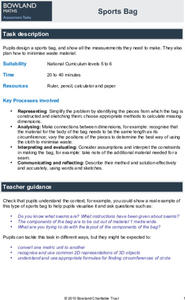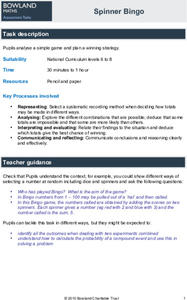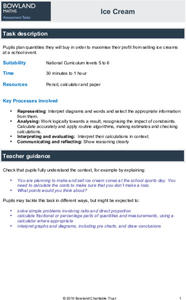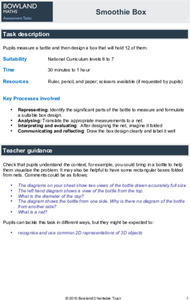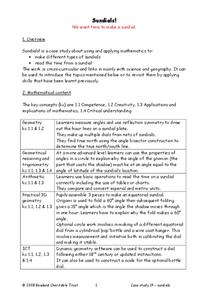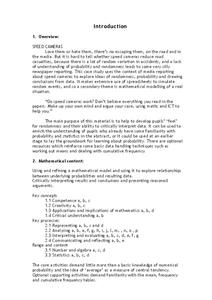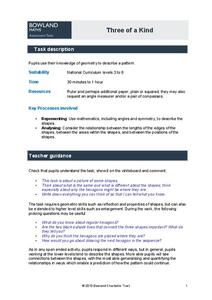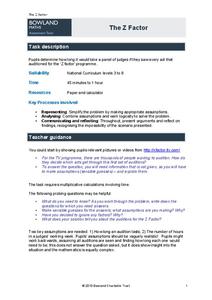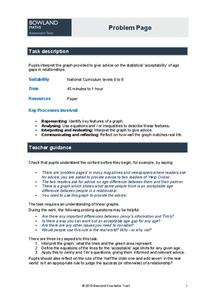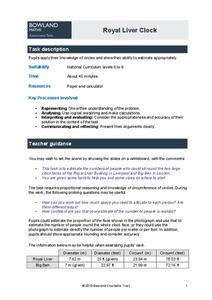Bowland
Tuck Shop
Correct a misleading conclusion. Individuals review a set of data and a conclusion to determine what is wrong with the conclusion. Pupils then represent the data with an appropriate display. Finally, learners develop a correct conclusion...
Bowland
Taxi Cabs
Determine the cheapest way to the airport. Pupils read a scenario about trying to get 75 people to the airport using two different sizes of taxis. Learners calculate the number of smaller taxis needed given a number of large taxis and...
Bowland
Sports Bag
Lay it out using the least amount of material. Learners use the dimensions of a cylindrical sports bag to find out the size of pieces of material needed to sew them. The pupils find the best placement of the pieces to use the least...
Bowland
Spinner Bingo
Create a winning card. Given a description of a bingo game using two spinners, pupils determine which of three cards has the greatest chance of winning. Scholars then determine which are the best numbers to put on their own cards to give...
Bowland
Security Camera
Take an overall view of percentages. Pupils determine whether a shop owner's claim is correct about what percent of his shop is viewable from the installed security camera. Learners try to find whether there is a better location for the...
Bowland
Patchwork Cushions
Find out if there are enough squares. Given diagrams for the first four figures in a sequence, pupils try to determine the next figure. Individuals find the number of square and triangle pieces of fabric that are required to make...
Bowland
Ice Cream
Make sure there is enough ice cream on hand. Learners try to find out how much ice cream to buy for a sports event. Scholars use a pie chart showing the percent of a sample of people who like different flavors of ice cream. Using the...
Bowland
Hot Under the Collar
It is close enough for all practical purposes. Pupils see two methods to convert degrees Celsius to degrees Fahrenheit, one with exact numbers and another using estimation. Learners review both methods and determine when the estimation...
Bowland
Counting Trees
Let's find a way to determine how many there are. Given a diagram of trees on a plantation, pupils devise a way to estimate the number of old and new trees. Using their methods, learners create estimates for the number of the two types...
Bowland
Smoothie Box
Make it a tight fit. Given drawings of a smoothie bottle, pupils need to determine the size of a box to hold 12 bottles. Scholars draw a net to show the dimensions needed to create a closed box that would not allow the bottles to move...
Bowland
Lottery
Take a chance on raising money. Learners calculate probabilities to determine whether a lottery is a good way to raise money. Pupils determine the number of combinations of choosing two numbers between one and six. Using the sample...
Bowland
Candle Box
Shine some light on nets. Using a creative assessment task, pupils create a net that would fold up into a hexagonal box and include the tabs needed for gluing the box together. Scholars then draw candles on each of the sides and the top...
Bowland
Speedy Santa
Santa sure is fast. In the assessment task, learners calculate the number of minutes Santa can spend at each house. This calculation requires the use of given population demographics data.
Bowland
You Reckon?
Sometimes simple is just better. A set of activities teaches young mathematicians about using plausible estimation to solve problems. They break problems down to simpler problems, use rounding and estimation strategies, and consider...
Bowland
Torbury Festival
Have you been to Torbury Fair? In the set of four lessons, learners solve a myriad of problems related to a music festival, including situations involving floods, market stalls, cows, and emergency plans.
Bowland
Water Availability
Just how scarce is water in different parts of the world? Through these water lessons, young data analysts use provided data to investigate the scarcity of water in countries of the Middle East and Africa. They use ratios and rates to...
Bowland
Sundials!
Time to learn about sundials. Scholars see how to build sundials after learning about Earth's rotation and its relation to time. The unit describes several different types of possible sundials, so choose the one that fits your needs — or...
Bowland
Speed Cameras
Do speed cameras help reduce accidents? Scholars investigate this question using a series of spreadsheet activities. Along the way, they learn about randomness, probability, and statistical analysis.
Bowland
Three of a Kind
One is chance, two is a coincidence, three's a pattern. Scholars must determine similarities and differences of a regular hexagon undergoing dilation. They look at lengths, angles, areas, and symmetry.
Bowland
The Z Factor
Young mathematicians determine the number of hours it would take judges of the "Z Factor" television talent show to watch every act. Participants make estimates and assumptions to solve the problem.
Bowland
Soft Drinks
"Statistics are no substitute for judgment" - Henry Clay. Young mathematicians use provided statistics from a soda taste test to explain why conclusions are faulty. They devise a new test that would be more appropriate than the one given.
Bowland
Problem Page
Future mathematicians use a given graph to answer a question about age differences in relationships. Along the way, they must find the equation and inequality of given graphs.
Bowland
Royal Liver Clock
Using clocks as dining tables? Scholars estimate the number of people that can sit around the face of the clock on the Royal Liver Building in Liverpool. They use estimation to justify their responses.
Bowland
Public Transport
"Statistics is the grammar of science" -Karl Pearson. In the assessment task, learners read a claim made by a newspaper and analyze its conclusions. They need to think about the sample and the wording of the given statistics.




